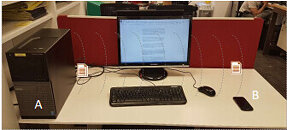It was only a few weeks ago when we reported that Dr. Mordechai Guri and his team had devised a new cyberattack known as Air-ViBeR which could use the vibrations of a PC's fans to steal data by regulating fan speed and recording the sounds on a nearby smartphone. This time Dr. Mordechai and his team have discovered a way to silently transmit data from the ultrasonic frequencies put out by a PC power supply they have dubbed this new attack POWER-SUPPLaY. The cyberattack involves a piece of malware that can alter system load by changing the CPU workload, this causes the PC power supply to change its ultrasonic frequencies which can be detected by a smartphone at a maximum distance of 5 m.
While this cyberattack is certainly technologically impressive, it is unlikely to ever be used out of anything but a Hollywood movie due to some fatal limitations. The attack requires the computer to be compromised and for a mobile device to be within listening distance for a prolonged time, the transmission rate of the attack is only 50 bits per second, or equivalent to about 22.5 kB per hour. With such a low transmission rate the only data that could be feasibly transmitted would be plain text at a rate of 10,000 words an hour.

Dr. Mordechai Guri and his team have posted a demonstration video of the cyberattack in action.
View at TechPowerUp Main Site
While this cyberattack is certainly technologically impressive, it is unlikely to ever be used out of anything but a Hollywood movie due to some fatal limitations. The attack requires the computer to be compromised and for a mobile device to be within listening distance for a prolonged time, the transmission rate of the attack is only 50 bits per second, or equivalent to about 22.5 kB per hour. With such a low transmission rate the only data that could be feasibly transmitted would be plain text at a rate of 10,000 words an hour.

Dr. Mordechai Guri and his team have posted a demonstration video of the cyberattack in action.
View at TechPowerUp Main Site






